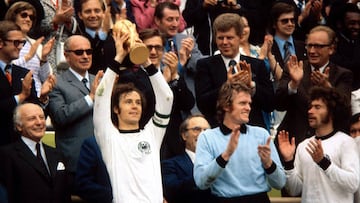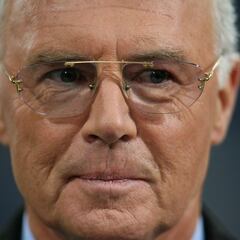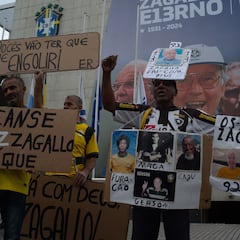How many trophies did Beckenbauer win with Bayern, Germany? How many Ballons d’Or?
Franz Beckenbauer, who has died at the age of 78, is best known for his achievements with Bayern Munich and Germany.


German soccer great Franz Beckenbauer, who died on Sunday at the age of 78, is a member of a select club of men who have won the FIFA World Cup both as a player and as a coach. Only two others - Brazil’s Mário Zagallo and France’s Didier Deschamps - have achieved the feat.
What did Beckenbauer win with Germany?
Chiefly a defender, Beckenbauer the player captained West Germany to victory at the 1974 World Cup - the crowning achievement of a 103-cap international career that also saw him skipper the side to the 1972 European title.
Sixteen years after lifting the World Cup at Munich’s Olympiastadion, Beckenbauer the coach then managed his country to success at Italia ‘90, having steered the side to second place in Mexico four years earlier.
A @FIFAWorldCup winner as both a player and coach.
— FIFA (@FIFAcom) January 8, 2024
Remembering the great Franz Beckenbauer — a legend of our game ❤️
What did Beckenbauer win with Bayern?
At club level, where he spent the vast majority of his playing career with German giants Bayern Munich, Beckenbauer’s resumé is also laden with major trophies.
A player who appeared 582 times for Bayern following his 1964 debut as an 18-year-old, he most notably captained the Bavarians to three straight European Cup wins in 1974, 1975 and 1976.
Double Ballon d’Or winner in 70s
After leading Bayern to their third successive continental crown, Beckenbauer was awarded his second career Ballon d’Or - an award that at the time was given to the year’s outstanding European footballer. He also received the France Football accolade in 1972, and twice finished second in the voting in the three years before he reclaimed the trophy.
Beckenbauer is one of just nine players in the history of the men’s game who have won the World Cup, the European Cup/Champions League and the Ballon d’Or.
Before leaving Bayern to join the New York Cosmos in 1977, he also won four German league titles, four German domestic cups, the 1966/67 European Cup Winners’ Cup and the 1976 Intercontinental Cup.
As a coach, Beckenbauer later had two short spells in the Bayern dugout, winning significant silverware in each. He piloted the side to the Bundesliga title in 1993/94, before returning as boss in 1996 to lead the Germans to victory over Bordeaux in the UEFA Cup final.
“Sublime” - Bayern, Germany react to Beckenbauer death
In the wake of Beckenbauer’s death, which was confirmed by his family on Monday, Bayern have paid tribute to their former player and coach, who was also club president between 1994 and 2009.
“The world of FC Bayern is no longer what it used to be - suddenly darker, quieter, poorer,” the club said. The 33-time German champions added that they “would never have become the club we are today” without Beckenbauer.
Beckenbauer’s former team-mate Uli Hoeness, now Bayern’s honorary president, said: “As a player, coach, president, person: unforgettable. Nobody will ever reach him.”
Major figures in the Germany set-up have also led the tributes, with national-team director Rudi Völler - who played under Beckenbauer at the 1990 World Cup - declaring that he “will forever remain the shining light of German football”.
Related stories

German soccer great Beckenbauer dies at 78

Tchau, Mario Zagallo
Germany’s head coach, Julian Nagelsmann, said: “For me, Franz Beckenbauer was the best footballer in German history […]. As a footballer, and later also as a coach, he was sublime - he stood above things. When Franz Beckenbauer entered a room, the room lit up.”
Die Welt des FC Bayern ist nicht mehr die, die sie mal war – plötzlich dunkler, stiller, ärmer: Der deutsche Rekordmeister trauert um Franz Beckenbauer, den einzigartigen „Kaiser“, ohne den der FC Bayern niemals zu dem Verein geworden wäre, der er heute ist.
— FC Bayern München (@FCBayern) January 8, 2024
Ruhe in Frieden.